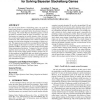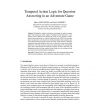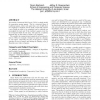566 search results - page 29 / 114 » Artificial Intelligence for Adaptive Computer Games |
116
click to vote
ATAL
2008
Springer
14 years 11 months ago
2008
Springer
In a class of games known as Stackelberg games, one agent (the leader) must commit to a strategy that can be observed by the other agent (the follower or adversary) before the adv...
AGI
2008
14 years 11 months ago
2008
Inhabiting the complex and dynamic environments of modern computer games with autonomous agents capable of intelligent timely behaviour is a significant research challenge. We illu...
ATAL
2008
Springer
14 years 11 months ago
2008
Springer
We consider Coalitional Skill Games (CSGs), a simple model of cooperation among agents. This is a restricted form of coalitional games, where each agent has a set of skills that a...
ATAL
2010
Springer
14 years 11 months ago
2010
Springer
Multi-agent learning is a crucial method to control or find solutions for systems, in which more than one entity needs to be adaptive. In today's interconnected world, such s...
CSCLP
2007
Springer
15 years 4 months ago
2007
Springer
The notion of optimality naturally arises in many areas of applied mathematics and computer science concerned with decision making. Here we consider this notion in the context of ...



